|
|
|
Sort Order |
|
|
|
Items / Page
|
|
|
|
|
|
|
| Srl | Item |
| 1 |
ID:
136340


|
|
|
|
|
| Summary/Abstract |
“Salafi”, also known as salafiyya, is derived from the Arabic, meaning“the venerable predecessors”, who are the“first three generations of Islam”. In the different interpretations of the Arabic scriptures,“Salafi” evolved gradually into“Doctrinal, Political and Jihad Salafi”.“Jihadist Salafi”, also known as“Salafi Jihadism”or the“Salafi Global Jihad Movement”, by means of falsification of the religious terms in the Koran and Hadith, bewitched its followers with a message of martyrdom for Islam through violence and“Jihad”, eliminated all the heretics, established Islamic political power and restored“true Islam”religiously. Since 2011, a series of terrorist attacks carried out by“Jihadist Salafi”, represented by Jund al-Khilafah in Central Asia, have posed serious threats to regional security. This not only impacts on the anti-extremism policies and anti-extremism policies of Central Asian countries and severely challenges the SCO and CIS, but also poses a significant threat to the security of China’s Northwest.
|
|
|
|
|
|
|
|
|
|
|
|
|
|
|
|
| 2 |
ID:
134681


|
|
|
|
|
| Summary/Abstract |
Amidst international furor over its annexation of Crimea, Russia quietly acquired a far more lucrative territory through different means: in March, the United Nations recognized Russia's claim to the resource-rich “Peanut Hole” in the center of the Sea of Okhotsk. This strategically and economically important body of water—a “real Ali Baba's cave” of untapped oil and gas reserves—lies within a contentious triangle formed by eastern Russia and northern Japan. Securing the Okhotsk's legal status as an internal sea goes far to advancing Russian claims in the Arctic, and bolsters Russia's bargaining position over four disputed Kuril islands which Japan callsits “Northern Territories.”
|
|
|
|
|
|
|
|
|
|
|
|
|
|
|
|
| 3 |
ID:
136858


|
|
|
|
|
| Summary/Abstract |
In the shadow of one of Europe’s most sustained terrorist problems, Greece is entering a new era of radical left-wing politics. George Kassimeris explore the threat facing the country’s counter-terrorism agencies from the next generation of militant anarchists.
|
|
|
|
|
|
|
|
|
|
|
|
|
|
|
|
| 4 |
ID:
134988


|
|
|
|
|
| Summary/Abstract |
Illegal organizations, like mafia syndicates, gangs, and insurgencies, are often highly cohesive and hostile toward the outside world. Such groups cultivate a particular form of “anti-social” capital, which relies on ingroup bonding and limits outgroup bridging for the purpose of commissioning illicit acts. We argue that experiences within the group leave members with varying intensities of anti-social capital, and that higher intensities lead to significantly weaker relationships with political institutions and civil society, even many years after they exit the group. We test this theory using survey data from 1,485 former members of insurgent and paramilitary groups in Colombia, along with insights from 68 qualitative interviews. We find strong evidence that anti-social capital has individually varying and sticky effects on former members. These effects are pervasive and intense, and exhibit surprising and counterintuitive properties: former members of pro-state militia with higher levels of anti-social capital are systematically less likely to trust political institutions, while members of peasant-based insurgent groups with high levels of anti-social capital are less likely to participate in their communities.
|
|
|
|
|
|
|
|
|
|
|
|
|
|
|
|
| 5 |
ID:
134457


|
|
|
|
|
| Summary/Abstract |
In this article, we assess the impact of counterterrorism measures on trade. Our work brings three value addition to the literature: (1) it develops a simple theory to emphasize the endogeneity between terrorism acts, counterterrorism measures, and trade; (2) it delivers an original strategy to identify empirically the effect of counterterrorism security measures on trade flows (using third country incidents); and (3) it uses a new data set on business visas issued by the United States to test further the hypothesis that terrorism is affecting trade through the security channel. Our results suggest that counterterrorism security measures matter for US imports. The level of the impact is up to three times higher when the acts result in a relatively high number of victims, when the products are sensitive to shipping time, or when they ask for networks and business people mobility in order to be sold.
|
|
|
|
|
|
|
|
|
|
|
|
|
|
|
|
| 6 |
ID:
136659
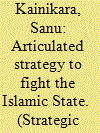

|
|
|
|
|
| Summary/Abstract |
President Barack Obama has detailed his strategy to degrade, defeat and ultimately destroy the Islamic State (IS) (the IS is also referred to as the Islamic State of Iraq and Syria [ISIS]) currently considered the most threatening of the various terrorist groups operating primarily in the Middle East. Fundamental to the success of the strategy is military action aimed at degrading the combat capabilities of the fighting elements of the IS. However, based on previous experience, it is obvious even to the casual observer that military action alone will not bring success in ‘destroying’ the IS as an entity. In fact, going by a number of reports, it seems certain that, unlike other such groups,1 the IS has already gained the trappings of an established state—control of territory, an administrative machinery, tax collection facilities, welfare activities undertaken by a central authority, education systems and an effective if brutal police force. Such an entrenched entity cannot be defeated and made irrelevant by military actions alone.
The group poses a clear threat to all countries in the Middle East, Europe, the US and America’s allies elsewhere. It has been able to gain strength by leveraging the civil war in Syria and exploiting the sectarian divide still very visible in Iraq. The IS has established itself through the use of a potent combination of insurgent, terrorist and conventional military tactics and the vicious use of violence to seize control of large swathes of territory in both Syria and Iraq, as well as weapons and natural resources.
|
|
|
|
|
|
|
|
|
|
|
|
|
|
|
|
| 7 |
ID:
135648


|
|
|
|
|
| Summary/Abstract |
First it was Syria, now Iraq and the creation of a Caliphate incorporating parts of Syria and Iraq by ISIS (now simply IS) that will take the West’s eye further off Afghanistan a second time. Earlier, American President Barack Obama’s stunning political statement fixing the deadline for final troop withdrawal from Afghanistan as end-2016, not as widely believed, 2025, contingent upon the signing of the Bilateral Security Agreement was psychologically a negative development. Obama has outlined a new strategy for a new coalition of the willing that will attempt to roll back IS over the next three years. Precious resources will be diverted to fight the new war against the most extreme and violent form of terrorism that has attracted nearly 15,000 foreign Muslim youth.
|
|
|
|
|
|
|
|
|
|
|
|
|
|
|
|
| 8 |
ID:
137030
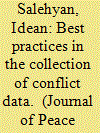

|
|
|
|
|
| Summary/Abstract |
Quality data is at the heart of all empirical research. Data collection on contentious politics, including civil war, terrorism, and protest has proceeded at a rapid pace over the last several years. This special section develops a set of best practices and offers advice to those involved in collecting conflict data as well as those who are regular users of such data. In this introduction, the process of data collection is considered, including source selection, information extraction or ‘coding’, and data sharing. A set of six rules is offered, which will hopefully guide others as they compile quantitative data on conflict processes.
|
|
|
|
|
|
|
|
|
|
|
|
|
|
|
|
| 9 |
ID:
134940
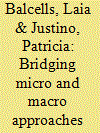

|
|
|
|
|
| Summary/Abstract |
This article reflects on the importance of linking micro and macro levels of analysis in order to advance our current understanding of civil wars and political violence processes and discusses the contributions of the articles in this special issue. We first identify the main problems in research on political violence that is focused on a single level of analysis and describe the challenges faced by research that attempts to establish connections between different levels. We then introduce the different articles in the special issue, with an emphasis on the micro–macro-level linkages they develop and highlighting their commonalities. We conclude by emphasizing the importance of a new research agenda for the study of civil wars and political violence that bridges social, economic, and political dynamics occurring at the local level and conflict processes taking place in the macro arena.
|
|
|
|
|
|
|
|
|
|
|
|
|
|
|
|
| 10 |
ID:
135091


|
|
|
|
|
| Summary/Abstract |
The author uses the latest theoretical and conceptual approaches to world politics and international security to analyze the Afghan problem. He suggests that certain commonly accepted ideas about the strategic situation in Afghanistan should be reviewed to arrive at more exact interpretations of the “traditional” and “non-traditional” threats and other concepts. He also formulates a concept of systemic securitization for Afghanistan’s future.
|
|
|
|
|
|
|
|
|
|
|
|
|
|
|
|
| 11 |
ID:
136481


|
|
|
|
|
| Summary/Abstract |
Feeding the rapid rise of the Islamic State, Tunisia provides a prodigious number of recruits to jihadist movements and activities in Iraq and Syria. Simon Speakman Cordall examines the social and intellectual appeal of jihad in Tunisia, tracing its historical development within a national and global context and positing that the current U.S.-led air campaign targeting the Islamic State may only be fueling its appeal.
|
|
|
|
|
|
|
|
|
|
|
|
|
|
|
|
| 12 |
ID:
135685


|
|
|
|
|
| Summary/Abstract |
Islamic State’s presence in south Asia is on the rise, and increasing number of young people are being radicalised and joining the group. Bidhu Prashad Routray examines Islamic State’s expansion and the rising threat it poses to the region.
|
|
|
|
|
|
|
|
|
|
|
|
|
|
|
|
| 13 |
ID:
137073


|
|
|
|
|
| Summary/Abstract |
This paper is a cautiously sympathetic treatment of conspiracy theory in Pakistan, relating it to Marxist theories of the state, structural functionalism and Machiavellian realism in international relations. Unlike moralising mainstream news reports describing terrorism in terms of horrific events and academic research endlessly lamenting the ‘failure’, ‘weakness’ and mendacity of the Pakistani state, conspiracy theory has much in common with realism in its cynical disregard for stated intentions and insistence on the primacy of inter-state rivalry. It contains a theory of the postcolonial state as part of a wider international system based on class-conspiracy, wedding imperial interests to those of an indigenous elite, with little concern for preserving liberal norms of statehood. Hence we consider some forms of conspiracy theory a layperson’s theory of the capitalist state, which seeks to explain history with reference to global and domestic material forces, interests and structures shaping outcomes, irrespective of political actors’ stated intentions. While this approach may be problematic in its disregard for intentionality and ideology, its suspicion of the notion that the ‘War on Terror’ should be read morally as a battle between states and ‘non-state actors’ is understandable – especially when technological and political-economic changes have made the importance of impersonal economic forces driving towards permanent war more relevant than ever.
|
|
|
|
|
|
|
|
|
|
|
|
|
|
|
|
| 14 |
ID:
137017


|
|
|
|
|
| Summary/Abstract |
This article illuminates how, since 9/11, security policy has gradually become more central to a range of resilience discourses and practices. As this process draws a wider range of security infrastructures, organizations and approaches into the enactment of resilience, security practices are enabled through more palatable and legitimizing discourses of resilience. This article charts the emergence and proliferation of security-driven resilience logics, deployed at different spatial scales, which exist in tension with each other. We exemplify such tensions in practice through a detailed case study from Birmingham, UK: ‘Project Champion’ an attempt to install over 200 high-resolution surveillance cameras, often invisibly, around neighbourhoods with a predominantly Muslim population. Here, practices of security-driven resilience came into conflict with other policy priorities focused upon community-centred social cohesion, posing a series of questions about social control, surveillance and the ability of national agencies to construct community resilience in local areas amidst state attempts to label the same spaces as ‘dangerous’. It is argued that security-driven logics of resilience generate conflicts in how resilience is operationalized, and produce and reproduce new hierarchical arrangements which, in turn, may work to subvert some of the founding aspirations and principles of resilience logic itself.
|
|
|
|
|
|
|
|
|
|
|
|
|
|
|
|
| 15 |
ID:
135988


|
|
|
|
|
| Summary/Abstract |
This article is a qualitative analysis of nation-state population “resiliency” to several spectacular and/or highly symbolic terrorist assaults that were watershed events. It draws heavily from qualitative comparative analysis (QCA) frameworks to isolate and identify the presence of what Goertz calls the “secondary dimensions” of a “primary concept” such as resiliency to terrorist assaults. In turn, the presence of those secondary dimensions and their strength presuppose and derive from “tertiary indicators” that are the basic metrics and concrete manifestations of those secondary dimensions. The nation-states under consideration include the London bombings of 2005, the United States for 9/11, the Madrid bombings of 2004, the first suicide bombings within pre-1967 boundaries of Israel, and the Russian Federation in the case of the 2002 terrorist assault against the Dubrovka Theater in Moscow. The results serve as the basis for the development of a “resiliency continuum” of nation-states where placement of those countries on the continuum reflect “nonresilient,” “semiresilient,” and “resilient” conditions, themselves defined by the number of secondary dimensions found in each case study. In the process, the analysis illuminates possible interconnections between “context specific” factors, such as a country’s historical experience with terrorism and population characteristics (e.g., education levels, degree of heterogeneity) to the resiliency or nonresiliency condition, and describes possible links between exogenous “systems factors” such as war and power ranking to the resiliency condition.
|
|
|
|
|
|
|
|
|
|
|
|
|
|
|
|
| 16 |
ID:
137058


|
|
|
|
|
| Summary/Abstract |
In this previously unpublished interview, James R. Clapper, Jr., the current Director of National Intelligence (DNI) in the United States, discusses his experiences as spymaster leading an Intelligence Community widely viewed as organizationally decentralized and criticized in the past for failing to work together harmoniously. Director Clapper argues that the Community has become much more structurally integrated, and that the Office of the DNI (ODNI) provides an opportunity for leadership that is more effective than outside critics have acknowledged. I conducted this interview in August 2014 at his office near Tyson's Corner in North Arlington, Virginia. It was a time of rising unrest in the world, with elite Russian troops carrying out forays across the border into Ukraine, a Middle East terrorist faction known as ISIS gathering momentum in a march from Syria toward Baghdad, and with recurring violence that continued to plague the relationship between the Hamas faction in Palestine and the state of Israel
|
|
|
|
|
|
|
|
|
|
|
|
|
|
|
|
| 17 |
ID:
134937


|
|
|
|
|
| Summary/Abstract |
Why do some terrorist organizations, but not others, adopt suicide bombing as a tactic? Dominant accounts focusing on organizational capacity, ideology, and efficacy leave certain elements of the phenomenon unexplained. The authors argue that a key factor that influences whether a terrorist organization does or does not adopt suicide terrorism is cultural resonance. This is the idea that deep and specific cultural logics, which transcend religion and nationalism, enable and constrain the sorts of instrumental behaviors that can be utilized in the pursuit of group goals. The article investigates the role of a well-established cultural orientation of collectivism, which enables the authors to measure culture systematically. Case studies, survey data, and experimental research are used to illustrate that collectivism lowers the cost of adoption by facilitating the recruitment of attackers and reducing societal backlash against self-sacrifice. The authors then test for the relationship between collectivism and suicide-bombing adoption using an event history analysis framework, finding a strong correlation.
|
|
|
|
|
|
|
|
|
|
|
|
|
|
|
|
| 18 |
ID:
135748
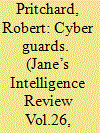

|
|
|
|
|
| Summary/Abstract |
Governments are increasing cyber-warfare, traditionally a private sector-led domain. However as Robert Pritchard assesses, the inherent difficulties of fighting online enemies mean a civilian response may still be the best options
|
|
|
|
|
|
|
|
|
|
|
|
|
|
|
|
| 19 |
ID:
136813


|
|
|
|
|
| Summary/Abstract |
India has to be more vigilant towards its security and strategic assets in the 21st century because this century belongs to ICT (cyber-revolution) like Airplanes in 20th century. Both the century human efforts mould the time space compression; brought some new causality, develop technocratic ability and so on.
|
|
|
|
|
|
|
|
|
|
|
|
|
|
|
|
| 20 |
ID:
136170
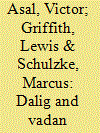

|
|
|
|
|
| Summary/Abstract |
For classes which contain a discussion of strategy, war, political violence, terrorism, insurgency, peace operations, or ethno-nationalist conflict to name a few, students must have an effective, foundational understanding of the complexities of using military force. To that end, we have developed an operational “battlefield” exercise, the Dalig–Vadan Exercise (DVE), which allows an entire class of students to get a sense of the dynamics and complexities of command and execution of competing strategies without any military background, any particular emphasis on time, place, or context, and de-emphasizing the consequences of violence. Anchored on Clausewitz's friction and fog, the DVE provides students with a first-person encounter with decision making in a dynamic, multiparty, informational-limited, and time-sensitive environment that can be related to a wide range of courses and course material in international relations and related fields.
|
|
|
|
|
|
|
|
|
|
|
|
|
|
|
|
|
|
|
|
|